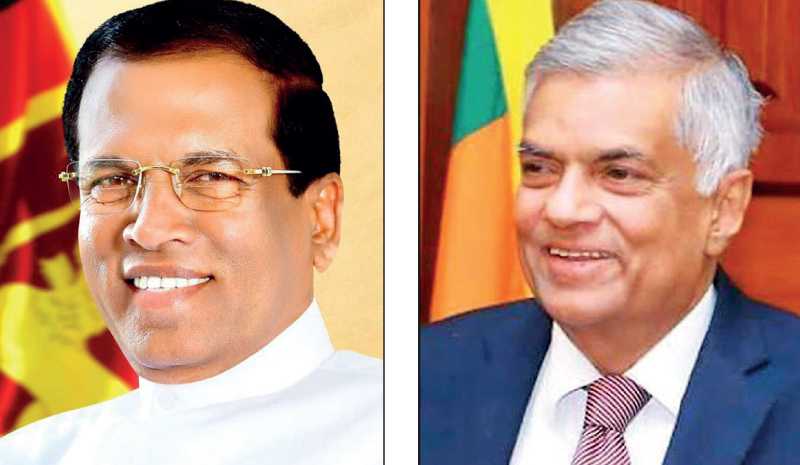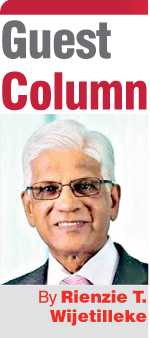Sunday Feb 15, 2026
Sunday Feb 15, 2026
Thursday, 22 October 2020 01:08 - - {{hitsCtrl.values.hits}}

Multiple officials from the Sri Lankan Police, Armed Forces and Intelligence Services have confirmed that the information was available and that it was communicated to the highest levels. However the former President and Prime Minister are simply saying they did not receive the security briefs. They are blaming each other and the state apparatus that was under their stewardship
Sri Lankans around the world remain bemused at revelations from the ongoing investigation in to the 2019 Easter attacks. The Presidential Commission of Inquiry has so far seen a roll call of former leaders and high ranking officials from the previous regime providing any number of vague excuses and abdicating responsibility for their inaction. 
The former President, who is now a member of the ruling party and was the Minister of Defence and Commander in Chief at the time, must provide better answers than simply saying he was not informed. There is growing evidence that in fact he was informed. The former President also stated that the Prime Minister was not invited to the security briefings because he suspected the Prime Minister of leaking the contents of the briefings to the press. This highlights the complete shambles of the previous Government’s handling of the security apparatus. There was no cohesion, no alignment, only conflicting political agendas and the people are left to pick the pieces of their disastrous ineptitude.
The death toll numbers in the hundreds, but this is just the tip of the iceberg, as there are perhaps thousands affected. Every family that lost a loved one must still suffer daily at not having them close when they go to bed at night or sit for a meal together. The dreams of so many young Sri Lankans were destroyed, livelihoods vanished and hearts broken. There were multiple funerals per street in some areas of the country and the victim’s pain is only exacerbated by the new details emerging weekly from the PCoI sessions. They deserve real answers and tangible relief.
As per CNN, Indian Intelligence services passed on ‘unusually specific’ information in the weeks before the attack, gathered from an ISIS suspect arrested and interrogated on Indian soil. Sri Lankan officials were warned on 4 April of possible attacks against Christian churches and tourist spots; the same warnings were sent two days before the attack and two hours before the attack. This amounts to ‘willful negligence’.
The name Zahran Hashim was disclosed by a terror suspect and even appears on a memo dated 11 April signed by the Police DIG stating that there is a possible threat from him and his organisation; NTJ. In fact, police and intelligence services had known about the NTJ for over two years before the attacks.
Explosives had been uncovered in the Eastern Province and even linked to Islamist terrorist activities. In January 2019, in the North West of the country, in Wanathawilluwa near Puttalam, a group was arrested upon the discovery of 100 kg of explosives as well as other materials required for the manufacture of bombs. Hundreds of detonators, wire cords, rifles and ammunition as well as six 20 litre cans of Nitrate Acid, which is banned in Sri Lanka, was also discovered. Why was the country and its people not put on high alert and warned about the dangers posed by religious fundamentalism?
The chemical Triacetone Triperoxide (TATP) is thought to have been used for the Easter attacks. TATP is made from household ingredients such as nail polish remover and hydrogen peroxide. These items are supposed to be screened by police to prevent their purchase in large stocks. The operation to build the bombs was connected to the copper factory in Wellampitiya. We had read reports of armed milita groups operating with impunity in the Eastern Province. Some groups were vandalising religious monuments throughout the last few years. We know that radical Islam had taken hold of many parts of the Eastern Province. Radicalisation and Arabisation has been occurring in parts of the country; what are the Government’s proposals to prevent this from continuing? What are the implications of the spread of extremism for the question of devolution of power? Can ordinary Sri Lankans trust local governments, given what has been brewing in the East?
Some of the barrels of explosive materials found near Puttalam had Indian markings on them. It should surprise no one that foreign influence played a key role in the radicalisation of the youth. Throughout the multi decade war against the LTTE, we remember how Western Liberal democracies allowed ‘charity’ organisations to operate without sufficient controls, raising funds for terror activities in Sri Lanka. President at that time, Mahinda Rajapaksa faced immense pressure from the international community to cease the onslaught against the LTTE. The President took decisive action at that time and deserves enormous credit for not succumbing to this pressure.
The Times of India reported that Indian Intelligence had been studying the spread of Wahabism in Eastern Sri Lanka for some time. We have seen reporting of large charity donations emanating from Saudi Arabia and other parts of the Middle East and directly benefiting powerful politicians from the East. The Times of India also reported that the Eastern region of Sri Lanka could become an operational zone for terror groups such as Lashkar-e-Taiba (LeT), the organisation responsible for the 2008 Mumbai Attacks. LeT’s own charity organisation; Idara Khidmat-e-Khalq was active in Tsunami relief efforts in Sri Lanka and the Maldives in 2004. Another suspicious charity by the name of Falah-i-Insaniyat was advertising in the Eastern Province in 2016. Indian Minister Kishan Reddy stated that this organisation had been banned by the UN but still operated online.
Sri Lanka also must manage the optics of this issue very carefully. Already there is a circus related to the arrest and subsequent release of the brother of a prominent MP who was linked to the suspected terrorists. That same MP is now apparently under arrest, after a brief period of going AWOL, for misappropriating funds in a separate case. People are asking a very valid question as to whether these two arrests are related in any way. What about the Governor and State officials of the Eastern Province that allowed a terrorist outfit to organise and establish itself under their watch; should there not be criminal charges brought against these officials?
A Muslim human rights lawyer, Hejaaz Hizbullah, with links to two of the suicide bombers, had been arrested several months ago on terrorism charges. However human rights organisations including the usual suspects, Amnesty International, have claimed that he is being detained without credible evidence under provisions of the Prevention of Terrorism Act (PTA). These same rights organisations have been lobbying for the removal of the PTA and for reforms in Sri Lanka’s state intelligence services. What role have they played in creating the conditions for the Easter attacks?
Sri Lankans have traditionally been quite suspicious of non-governmental organisations due to their perceived sympathy and support for terrorist surrogates. However Sri Lanka, as a responsible member of the international community, must act with a level of prudence as its image is at stake. Sri Lanka has always been a victim of terrorism, however the Western driven narrative, derived from multinational extra-territorial organisations seems intent on painting Sri Lanka as the belligerent in most cases. In the case of the Easter attacks, Sri Lanka and Sri Lankans were victims of violent extremism and we should not allow that narrative to shift once again.
Multiple officials from the Sri Lankan Police, Armed Forces and Intelligence Services have confirmed that the information was available and that it was communicated to the highest levels. However the former President and Prime Minister are simply saying they did not receive the security briefs. They are blaming each other and the state apparatus that was under their stewardship. There are thousands of Sri Lankans that are eagerly awaiting the truth about what happened in April 2019 and they will not take kindly to any administration that drags their feet on matters of such urgency.
The authorities must expedite the inquiries. Officials in the security and intelligence apparatus have a duty to protect the citizens of the country. Which officials failed in their duty to protect, how did this failure occur given the information that was available and why was this information not acted upon? I urge the present Government to charge all those high ranking individuals involved during the time of the Easter attacks with manslaughter.
(The writer could be reached via email at [email protected].)